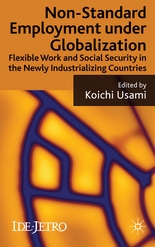Non-standard Employment under Globalization
—Flexible Work and Social Security in the Newly Industrializing Countries—
Palgrave Macmillan IDE-JETRO Series
Expansion of non-standard employment under globalization is widely observed in all of the newly industrializing countries. Non-standard employees and their labour conditions have become major issues of academic debate. This book focuses on three main areas; the deregulation of labour market, social protection for non-standard workers and social security reforms in accordance with the transformation of employment. The contributors to this volume analyze representative nations from the roster of newly industrializing countries from East Asia, Africa, and Latin America as follows: China, South Korea, Taiwan, South Africa, Mexico, and Brazil, examining the possibility that corporatism can solve the problem of non-standard workers in these regions. This book is essential reading for all interested in development economics, labour economics, social policy, social security, Latin American studies and Asian studies in the faculties of economics, sociology and international studies.

■ Non-standard Employment under Globalization
■ Edited by USAMI Koichi
■ £65.00
■ 228pp
■ 2009
■ ISBN978-0-230-23848-0
CONTENTS
Introduction / K. Usami
Labor and Social Security Reforms in Mexico: From the Perspective of State-Labor Relationships / K. Hata
Re-thinking Argentina's Labor and Social Security Reform in the 1990s: Agreement on Competitive Corporatism / K. Usami
The Changing Nature of Employment and the Reform of Labor and Social Security Legislation in Post-Apartheid South Africa / K. Makino
The Impact of the Transformation of Labor Relations on Social-Security System Reform in the People's Republic of China: The Growing Allure and Reality of Corporatism / Y. Sawada
The Tripartite Relationship and Social Policy in Taiwan: Searching for a New Corporatism? / Y. Kamimura
Labor and Welfare for an Advanced Economy in the Republic of Korea: A Policy Mix of Universalism and Neo-liberalism / J. Kim


